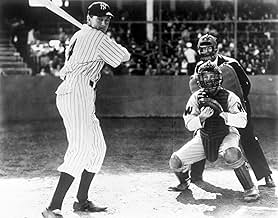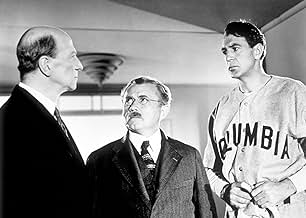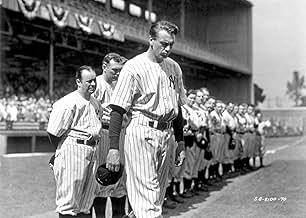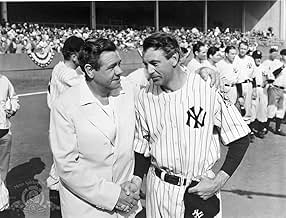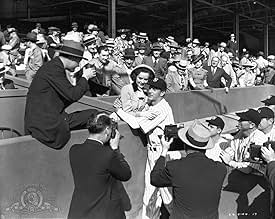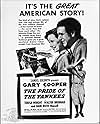PUNTUACIÓN EN IMDb
7,6/10
12 mil
TU PUNTUACIÓN
La historia de la vida y carrera del famoso jugador de béisbol Lou Gehrig.La historia de la vida y carrera del famoso jugador de béisbol Lou Gehrig.La historia de la vida y carrera del famoso jugador de béisbol Lou Gehrig.
- Ganó 1 premio Óscar
- 1 premio y 10 nominaciones en total
Ludwig Stössel
- Pop Gehrig
- (as Ludwig Stossel)
Bob Meusel
- Robert W. Meusel
- (as Robert W. Meusel)
Argumento
¿Sabías que...?
- CuriosidadesIn reality, Gary Cooper was decidedly not a fan of baseball and required extensive coaching in order to look even passable on a baseball diamond. In fact, he had never played the game before, even as a youth, and had never even seen a baseball game in person until he was hired for this film.
- PifiasAs Gehrig (Cooper) is doing his homework at Columbia, he writes with his right hand. Whilst Gehrig batted and threw left-handed, like many lefties of the era (perhaps because of "correction" in school), he wrote with his right hand.
- Citas
[last lines]
Lou Gehrig: [his farewell speech]
Lou Gehrig: Today, I consider myself the luckiest man on the face of the earth... play ball!
- Créditos adicionalesOpening credits acknowledgment: Appreciation is expressed for the gracious assistance of Eleanor Gehrig (as Mrs. Lou Gehrig) and for the cooperation of Ed Barrow (as Mr. Ed Barrow) and the New York Yankees arranged by Christy Walsh.
- Versiones alternativasA colorized version is available.
- ConexionesFeatured in Diamonds on the Silver Screen (1992)
- Banda sonoraTake Me Out to the Ball Game
(1908) (uncredited)
Music by Albert von Tilzer
Played during the opening credits and often in the score
Reseña destacada
In today's era of greedy athletes and their employers, the story of Lou Gehrig seems almost quaint. Here's a young man who by all accounts was selfless, kind-hearted, and rather introverted. And, of course, it didn't hurt that he was also a very good baseball player too. Put him on a lineup card today and he might not be the same player. Up until a few years ago, Gehrig's record of 2,130 consecutive games played was a record, a record that many thought would stand forever. For 16 years he was in the lineup as the Yankees' first baseman, never asking out for any reason. That alone should show you how special a person Gehrig was.
This biography is pretty straightforward. Unlike many of its kind, it doesn't show its protagonist somehow succeeding against all odds. Gehrig didn't have an abusive mother, he wasn't beaten up by kids at school, he wasn't learning-disabled, he didn't have attention-deficit disorder, he didn't come from abject poverty. He was simply a son in a working-class, immigrant family, as many were during the early decades of this century. And that's why Gehrig is so special to so many people - he symbolises their own hopes.
Gary Cooper is aces as Gehrig, and Teresa Wright is wonderful as his wife, Eleanor. If there's anything imperfect about the movie, it's that it is...well, a little predictable. That's something biopics can't avoid, of course, so it's no big problem. But even if most of the film doesn't impress you, the final speech at Yankee Stadium - when Gehrig was suffering visibly from the disease that would eventually be named after him - will move you past tears. And even better, when Gehrig's done his brief speech, he walks offscreen. If that movie were written today, he'd play another game and hit a game-winning home run. It's this film's honesty and sincerity that win you over.
This biography is pretty straightforward. Unlike many of its kind, it doesn't show its protagonist somehow succeeding against all odds. Gehrig didn't have an abusive mother, he wasn't beaten up by kids at school, he wasn't learning-disabled, he didn't have attention-deficit disorder, he didn't come from abject poverty. He was simply a son in a working-class, immigrant family, as many were during the early decades of this century. And that's why Gehrig is so special to so many people - he symbolises their own hopes.
Gary Cooper is aces as Gehrig, and Teresa Wright is wonderful as his wife, Eleanor. If there's anything imperfect about the movie, it's that it is...well, a little predictable. That's something biopics can't avoid, of course, so it's no big problem. But even if most of the film doesn't impress you, the final speech at Yankee Stadium - when Gehrig was suffering visibly from the disease that would eventually be named after him - will move you past tears. And even better, when Gehrig's done his brief speech, he walks offscreen. If that movie were written today, he'd play another game and hit a game-winning home run. It's this film's honesty and sincerity that win you over.
- dfranzen70
- 29 feb 2000
- Enlace permanente
Selecciones populares
Inicia sesión para calificar y añadir a tu lista para recibir recomendaciones personalizadas
Detalles
- Fecha de lanzamiento
- País de origen
- Idioma
- Títulos en diferentes países
- The Pride of the Yankees
- Localizaciones del rodaje
- Empresa productora
- Ver más compañías en los créditos en IMDbPro
- Duración2 horas 8 minutos
- Color
- Relación de aspecto
- 1.37 : 1
Contribuir a esta página
Sugerir un cambio o añadir el contenido que falta

Principal laguna de datos
By what name was El orgullo de los Yanquis (1942) officially released in India in English?
Responde

